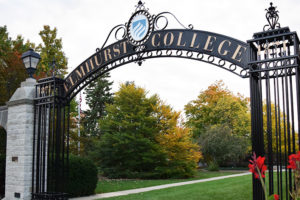
When Father Robert Barron preaches, his message reaches millions.
Barron is a Catholic priest of the Chicago Archdiocese, but his pulpit is no ordinary one. As the host and creator of the TV series Catholicism and the head of the global media organization Word on Fire Ministries, Barron has become perhaps the most prominent Catholic media figure since the mid-20th century television pioneer Bishop Fulton Sheen. Chicago’s Cardinal Francis George calls Father Robert Barron “one of the Church’s best messengers.”
Barron will bring his message to Elmhurst College when he presents Evangelizing the Culture, the Joseph Cardinal Bernardin Lecture, on Wednesday, February 8.
As Sheen did in the early days of television, Barron has made it his mission to mine the potential of emerging media for delivering the Church’s word. His podcasts, YouTube commentaries, DVDs, and multimedia ventures have earned him a worldwide audience.
But none of his projects has been more ambitious than Catholicism, a ten-part documentary series—with accompanying book, DVD set, MP3s and study guides—that aired on PBS affiliates in 2011. Produced by Today Show veteran Matt Leonard, the series followed Barron from Rome to the Philippines, from Mexico City to the Holy Land, as he offered his take on the history and intellectual tradition of the church. Author George Weigel described the series as “the most important media project in the history of the Catholic church in America.”
Barron, a professor of systematic theology at the University of St. Mary of the Lake in Mundelein, argues that a church rocked by scandal in recent years cannot afford to shrink from engagement with the arts, sciences, politics and popular culture. That’s one reason why he can be found on YouTube, offering reviews of movies like The Dark Knight and Inception. In his lecture at Elmhurst, Barron will explain why it is more important than ever for the church “to come out from behind its walls” to engage the culture.
Barron’s lecture will begin at 7:30 p.m. in the Founders Lounge of the Frick Center. The lecture is free and the public is invited.